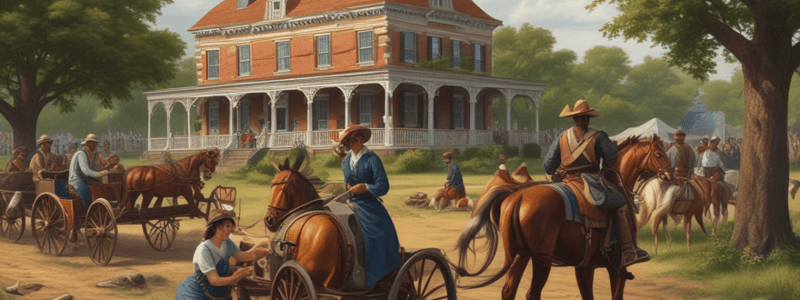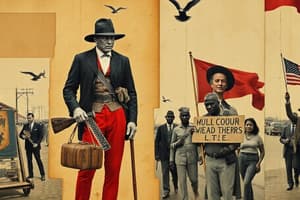Podcast
Questions and Answers
What was the purpose of the Black Codes in the South after the Civil War?
What was the purpose of the Black Codes in the South after the Civil War?
- To integrate schools for African Americans and Caucasians
- To grant African Americans full citizenship rights
- To encourage African Americans to move to the North
- To restrict the freedom of African Americans through laws (correct)
Which requirement was part of the Mississippi Plan to prevent African Americans from voting?
Which requirement was part of the Mississippi Plan to prevent African Americans from voting?
- Paying all taxes by March 1st
- Owning property in the state
- Having a family member who could vote before January 6, 1867 (correct)
- Proving literacy and understanding clauses
What was the outcome of the Plessy v. Ferguson case?
What was the outcome of the Plessy v. Ferguson case?
- Separate but equal treatment (correct)
- Abolition of segregation laws
- Integration of public facilities
- Strict enforcement of civil rights for all races
Who led the Populist Party that consisted of angry farmers in the West and South?
Who led the Populist Party that consisted of angry farmers in the West and South?
Which industry did John D. Rockefeller dominate with his company Standard Oil?
Which industry did John D. Rockefeller dominate with his company Standard Oil?
What concept did Andrew Carnegie promote in his book 'Gospel of Wealth'?
What concept did Andrew Carnegie promote in his book 'Gospel of Wealth'?
What was the significance of 'The Jungle' by Upton Sinclair?
What was the significance of 'The Jungle' by Upton Sinclair?
What was the main focus of the American Federation of Labor (AFL) led by Samuel Gompers?
What was the main focus of the American Federation of Labor (AFL) led by Samuel Gompers?
Which event triggered the Homestead Steel Strike?
Which event triggered the Homestead Steel Strike?
What did the Progressive Era aim to address?
What did the Progressive Era aim to address?
Which rule was established by the Hague Convention regarding warfare?
Which rule was established by the Hague Convention regarding warfare?
'The Future of War' was written by which author?
'The Future of War' was written by which author?
'Pullman Strike' was a reaction to what action by the company?
'Pullman Strike' was a reaction to what action by the company?
What was one of the main issues the 'Noble and Holy Order of Knights of Labor' wanted to address?
What was one of the main issues the 'Noble and Holy Order of Knights of Labor' wanted to address?
What did Theodore Roosevelt focus on in his conservation acts?
What did Theodore Roosevelt focus on in his conservation acts?
Who formed the first billion-dollar company in the world?
Who formed the first billion-dollar company in the world?
What was the main focus of the Arabic pledge by Germany?
What was the main focus of the Arabic pledge by Germany?
What was the significance of the Revenue Act mentioned in the text?
What was the significance of the Revenue Act mentioned in the text?
What did the Espionage Act make a crime according to the text?
What did the Espionage Act make a crime according to the text?
What was the outcome of the Meuse-Argonne Offensive mentioned in the text?
What was the outcome of the Meuse-Argonne Offensive mentioned in the text?
What did Wilson's 14 Points emphasize?
What did Wilson's 14 Points emphasize?
What was the goal of the Red Scare as described in the text?
What was the goal of the Red Scare as described in the text?
Who orchestrated a series of raids on alleged radical centers throughout the country?
Who orchestrated a series of raids on alleged radical centers throughout the country?
Who was responsible for orchestrating a series of raids on alleged radical centers throughout the country?
Who was responsible for orchestrating a series of raids on alleged radical centers throughout the country?
What event marked the beginning of the Great Depression?
What event marked the beginning of the Great Depression?
Why did people blame the banks during the Great Depression?
Why did people blame the banks during the Great Depression?
What was the purpose of the First Neutrality Act?
What was the purpose of the First Neutrality Act?
Why did the United States adopt a policy of isolationism during WWII?
Why did the United States adopt a policy of isolationism during WWII?
What was the purpose of the lend-lease act?
What was the purpose of the lend-lease act?
Who made the first non-stop flight across the Atlantic Ocean?
Who made the first non-stop flight across the Atlantic Ocean?
Flashcards are hidden until you start studying
Study Notes
Reconstruction and the Rise of Industrialization
- Bourbons: Democrats in the South who wanted to return to pre-Civil War conditions, limiting the freedom of African Americans through restrictive laws like Black Codes.
- Black Codes: Laws that prohibited African Americans from certain occupations, required them to sign yearly labor contracts, and restricted their voting rights.
- Mississippi Plan: Required citizens to live in the state for at least two years, prohibited certain crimes, and required all taxes to be paid by February 1st to vote.
- Literacy Test: Required voters to understand the document they were signing in order to vote.
- Grandfather Clause: Allowed voters to vote if their father or grandfather could vote by January 6, 1867.
- Plessy v. Ferguson: Supreme Court case that ruled "separate but equal" was constitutional, allowing segregation to continue.
The Gilded Age
- Patrons of Husbandry: Also known as the Grange, an organization of farmers that advocated for lower rates charged by railroads.
- Farmers' Alliance: A group of three independent organizations that advocated for farmers' rights.
- Populist Party: A party formed by farmers in the West and South that advocated for their rights, led by William Jennings Bryan.
- Inventions of the Gilded Age:
- Refrigerated railroad car
- Cattle/ranching
- Meat packing plants
- Mechanized glass making
- Cigarette rolling machine
- Rapid press machine
- Telephone
- Light bulb
Big Business and Industrialization
- John D. Rockefeller: Founder of Standard Oil Company, which controlled 90-95% of the nation's refineries and pipelines.
- Andrew Carnegie: Founder of a steel company that owned every step of the steel process, philanthropist who believed in the "Gospel of Wealth".
- J.P. Morgan: American financier and banker who bought out Carnegie's steel company for $480 million, creating the first billion-dollar company in the world.
Labor and Social Movements
- Great Railroad Strike: The first true interstate strike, involving 100,000 railroad workers from multiple states.
- Noble and Holy Order of the Knights of Labor: A secret society of tailors that advocated for 8-hour work days, an end to child and convict labor, and better working conditions.
- Haymarket Affair: A peaceful rally that turned violent, leading to the deaths of 7 police officers and 4 civilians, and the execution of 8 anarchists.
- American Federation of Labor: A loose grouping of small craft unions that advocated for better working conditions, led by Samuel Gompers.
- Homestead Steel Strike: A strike triggered by wage cuts and anti-union citations, resulting in the deaths of 7 Pinkerton agents and many injured workers.
- Pullman Strike: A strike triggered by wage cuts, resulting in the national guard breaking up the strike.
Progressive Era
- Muckrakers: A group of writers who exposed the problems in American society, such as Upton Sinclair's "The Jungle".
- Jacob Riis: A photographer who exposed the harsh conditions of tenement life.
- Government reforms:
- Directly electing senators (17th Amendment)
- Regulating big corporations
- Conservation movement
- Efficiency movement
- Social justice reforms (prohibiting child labor, fair labor standards, etc.)
World War I
- Causes of World War I:
- Assassination of Archduke Franz Ferdinand
- Imperialism and nationalism
- Militarism and alliances
- Central Powers: Austria-Hungary, Germany, and the Ottoman Empire
- Triple Entente: Britain, France, and Russia
- Lusitania: A British passenger ship sunk by a German U-boat, killing 128 Americans.
- National Security League: A group that advocated for compulsory military training and an increase in the size of the US army.
- Election of 1916: Woodrow Wilson won with the slogan "He kept us out of war".
World War I and the Interwar Period
- German Gamble: Germany's decision to resume unrestricted warfare, ignoring American reaction and probable entry into the war.
- Zimmerman Telegram: A telegram sent to the Mexican government, promising to return ceded territory if Mexico declared war on the US.
- American entry into World War I:
- Lever Food and Fuel Act: Gave the President power to manage food and fuel production.
- War Industries Board: Oversaw prices, conversion, and standardizing products.
- Espionage Act: Made it a crime to convey information intended to interfere with the US armed forces.
- Sedition Act: Made it a crime to make false statements that interfered with the prosecution of the war.
- Wilson's 14 Points:
- Freedom of navigation of the seas
- National armaments will be reduced
- League of Nations
- Treaty of Versailles: Demanded total victory over Germany and led to the rise of the Nazi party.
The Roaring Twenties and the Great Depression
- Red Summer: A period of white vs. black violence, with 25 anti-black riots.
- Red Scare: A fear that communists were working to destroy the American way of life.
- A. Mitchell Palmer and J. Edgar Hoover: Orchestrated a series of raids on alleged radical centers and founded the General Intelligence Division (now the FBI).
- Election of 1920: Warren G. Harding (R) vs. James Cox (D), the first election in which women could vote.
- Teapot Dome Scandal: Corruption by a Harding cabinet member, Albert Fall, who took bribes to allow oil drilling on public lands.
The Great Depression and World War II
- Stock Market Crash of 1929: The most devastating stock market crash in history, leading to the Great Depression.
- Herbert Hoover's response to the Great Depression:
- Refused direct federal intervention
- Advocated for voluntary effort to care for and help the reconstruction
- Gov't loans $500 million to ensure large banks, railroads, and savings and loans associations
- Bonus Army: A group of WWI vets who marched to D.C. in 1932 to demand the immediate payment of their government war bonuses in cash.
- Isolationism during WWII:
- Horrors of WWI
- Feeling of security by the ocean
- Merchants of death
- First Neutrality Act: Prohibited the export of arms, ammunition, and implements of war, and prohibited Americans from extending loans to belligerent nations.
- Lend-Lease Act: Provided Great Britain with supplies needed to fight Germany, leading to the US's entry into the war.
World War II
- American First Committee: Opposed American intervention in WWII, advocating for a non-interventionist policy.
- Charles Lindbergh: American pilot who made the first non-stop flight across the Atlantic Ocean, and opposed American intervention in WWII.
- Atlantic Charter: A joint statement of war aims by the US and Great Britain, discussing their respective war aims and leading to the formation of the United Nations.
- Boxer Rebellion: A 1900 uprising in China aimed at ending foreign influence in the country.
- Greater East Asia Co-Prosperity Sphere: A system founded by Japan consisting of other Asian countries during the early 20th century, reducing its members to puppet nations.
Studying That Suits You
Use AI to generate personalized quizzes and flashcards to suit your learning preferences.




